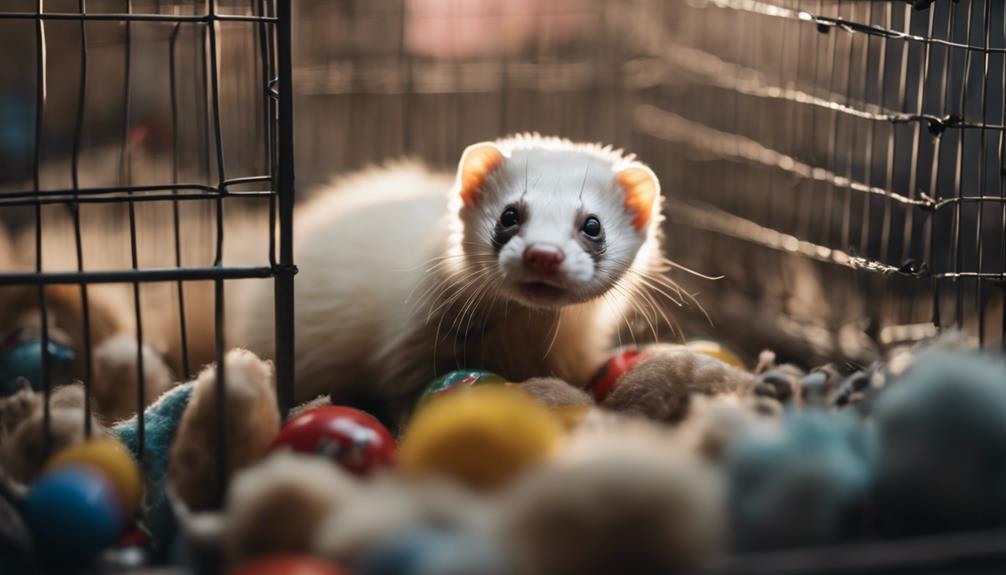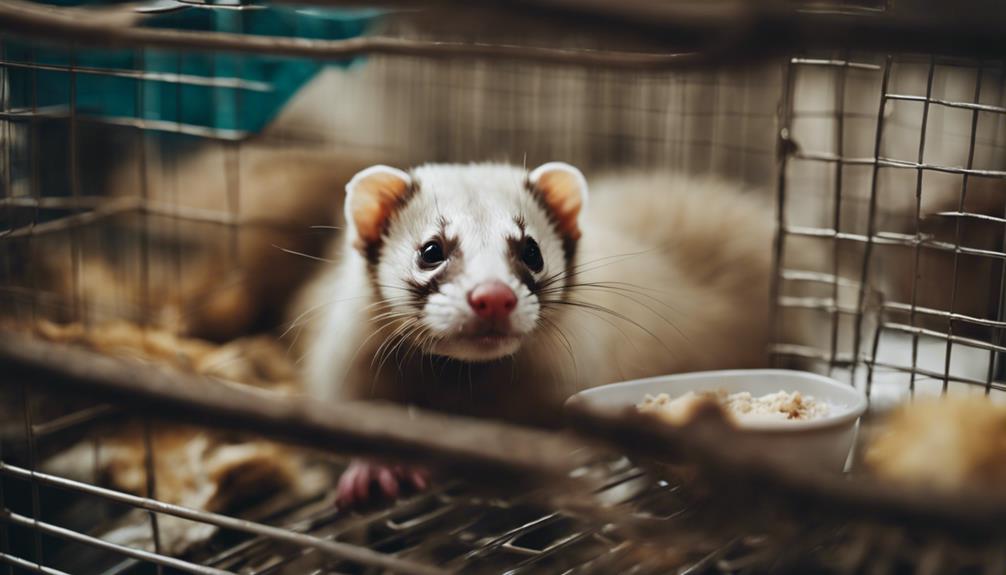What Health Risks Are Associated With Improper Ferret Housing?

Health Risks of Improper Ferret Housing:
- Inadequate housing can lead to respiratory issues in ferrets.
- Poor ventilation and high levels of ammonia from urine buildup can irritate a ferret's respiratory system.
- Behavioral problems can also arise from improper housing conditions.
- Limited space, lack of enrichment, and inappropriate temperatures can cause stress and behavioral issues in ferrets.
Respiratory Issues
Improper ferret housing can lead to respiratory issues such as infections and respiratory distress. One critical factor in maintaining good respiratory health for ferrets is ensuring adequate air quality and ventilation in their living environment. Poor ventilation can trap irritants like dust, mold, and ammonia from urine, all of which can negatively impact a ferret's respiratory system. These irritants can exacerbate allergies and lead to respiratory problems over time.
Proper ventilation helps to maintain a clean and fresh air supply for ferrets, reducing the concentration of allergens and irritants in the air. It's essential to regularly clean the ferret's living space, including bedding, toys, and litter boxes, to minimize the buildup of respiratory irritants. Additionally, using dust-free bedding and avoiding strong-smelling cleaning products can help prevent respiratory distress in ferrets.

Inadequate living conditions can contribute to stress-related problems in ferrets, impacting their overall health and well-being. Ferrets, like many animals, are susceptible to mental wellness issues when exposed to stressful environments.
Here are four key factors to consider for maintaining a stress-free environment for your ferret:
- Proper Socialization: Ferrets are social animals that thrive on interaction. Isolation or lack of companionship can lead to stress and anxiety.
- Adequate Space: Limited space can cause feelings of confinement and distress. Providing a spacious environment for exploration and play is crucial for their mental well-being.
- Stimulating Activities: Ferrets require environmental enrichment to prevent boredom and stress. Toys, tunnels, and opportunities for mental stimulation are essential.
- Consistent Routine: Establishing a predictable routine for feeding, playtime, and rest can help reduce stress by creating a sense of security and stability in their environment.
Injuries and Wounds

Ferrets, known for their playful nature, may inadvertently bite or scratch their owners, causing injuries that require medical attention. These small animals are also prone to accidental falls or getting trapped in inappropriate housing, leading to potential broken bones.
Proper housing design and supervision can help minimize the risk of these injuries, ensuring the safety and well-being of both the ferret and its human companions.
Bites and Scratches
Bites and scratches from ferrets can lead to serious injuries and wounds if not properly addressed and treated promptly. These small wounds can quickly become infected, posing risks to both the ferret and its owner. To prevent complications, here are some important points to consider:
- Prompt Cleaning: Thoroughly clean any bite or scratch with soap and water to reduce the risk of infection.
- Medical Attention: Seek medical help if the wound is deep, shows signs of infection, or if you haven't had a tetanus shot in the last five years.
- Behavioral Training: Address any behavioral issues with the ferret to reduce the likelihood of future bites or scratches.
- Handling Techniques: Learn proper handling techniques to minimize the risk of being bitten or scratched in the first place.
Broken Bones
When ferrets experience accidents or falls, they're susceptible to sustaining broken bones, leading to significant injuries and wounds that require immediate attention and care. In their home environment, ferrets may encounter situations that put them at risk of falls or getting trapped in hazardous areas, increasing the likelihood of bone fractures.
To prevent accidents that can result in broken bones, it's crucial for ferret owners to ensure that their housing is secure and free of any potential dangers such as gaps in the flooring, sharp edges, or unstable structures. Providing a safe and well-maintained living space for ferrets is essential in reducing the chances of them sustaining injuries like broken bones, promoting their overall health and well-being.
Digestive Disorders

Improper housing conditions can lead to severe digestive disorders in ferrets. These conditions can manifest in various ways and pose significant health risks to these small animals.
Here are four ways in which improper housing can contribute to digestive disorders in ferrets:
- Nutritional Deficiencies: Inadequate access to a balanced diet can result in nutritional deficiencies, impacting the ferret's digestive system and overall health.
- Gastrointestinal Blockages: Poor housing conditions may expose ferrets to materials that they can ingest, leading to gastrointestinal blockages that can be life-threatening.
- Stress-Induced Digestive Issues: Unsanitary or cramped living spaces can cause stress in ferrets, triggering digestive problems such as diarrhea or constipation.
- Hygiene-Related Illnesses: Dirty cages or contaminated food and water sources can introduce harmful bacteria or pathogens into a ferret's system, causing digestive illnesses.
Ensuring proper housing and environment for ferrets is crucial in preventing these digestive disorders and maintaining their well-being.
Parasitic Infestations

Unsanitary living conditions can make ferrets vulnerable to parasitic infestations, posing significant health risks to these small animals. Parasites such as fleas, ticks, mites, and internal worms can thrive in dirty environments, leading to various health issues in ferrets.
Prevention methods are crucial in safeguarding ferrets from parasitic infestations. Regular cleaning of the ferret's living space, including bedding and toys, is essential to prevent parasites from establishing themselves. Additionally, using vet-approved parasite prevention products such as spot-on treatments or oral medications can help protect ferrets from external parasites like fleas and ticks.
If a ferret does become infested with parasites, prompt treatment is necessary to prevent further health complications. Treatment options vary depending on the type of parasite infestation and may include oral medications, medicated baths, or environmental treatments to eliminate parasites from the ferret's surroundings. Seeking guidance from a veterinarian is crucial to determine the most effective treatment for the specific parasitic infestation affecting the ferret.
Temperature Regulation Challenges

Improper housing conditions can pose significant challenges for ferrets in regulating their body temperature. Heat stress risks can arise in environments that are too warm, potentially leading to dehydration and heat exhaustion.
Conversely, cold exposure dangers can result in hypothermia and other health issues for ferrets kept in overly chilly settings.
Heat Stress Risks
Inadequate temperature regulation in ferret housing can lead to significant heat stress risks for these animals. Ferrets are susceptible to heat stress due to their dense fur and inability to sweat, making it crucial to ensure proper cooling methods and preventive measures are in place.
Here are some key considerations to prevent heat stress in ferrets:
- Cooling methods: Provide access to cool surfaces or frozen items for them to lay on.
- Preventive measures: Ensure adequate ventilation and airflow in the living space.
- Hydration strategies: Always have fresh water available and consider offering water-rich fruits or vegetables.
- Warning signs: Monitor for symptoms like excessive panting, lethargy, or drooling, which indicate heat stress.
Cold Exposure Dangers
Ferrets face significant challenges in regulating their body temperature when exposed to cold environments, posing risks associated with hypothermia and other temperature-related health issues. To mitigate these dangers, proper bedding and insulation options are crucial.
Ferrets should have access to warm, cozy bedding materials such as blankets, towels, or specially designed bedding made of fleece to help them retain heat. Additionally, ensuring that their housing is well-insulated can help maintain a comfortable temperature for the ferrets.
Adequate insulation options include using materials like foam boards or thermal blankets to trap heat inside their living space. By providing suitable bedding and insulation, ferret owners can help prevent cold exposure dangers and support their pets' health and well-being.
Behavioral Abnormalities

Behavioral abnormalities in ferrets can result from environmental stressors and inadequate enrichment opportunities. These factors can significantly impact a ferret's well-being and lead to various behavioral issues. To address and prevent such problems, consider the following:
- Enrichment activities: Providing a variety of toys, tunnels, and climbing structures can keep ferrets mentally stimulated and engaged, reducing the likelihood of developing behavioral problems.
- Socialization opportunities: Regular interaction with humans and other ferrets is crucial for their social development. Lack of socialization can lead to anxiety and aggression in ferrets.
- Mental stimulation: Ferrets are intelligent animals that require mental challenges to prevent boredom. Puzzle feeders and interactive toys can help keep their minds active and prevent behavioral abnormalities.
- Environmental enrichment: Creating a stimulating environment with hiding spots, different textures to explore, and opportunities for play can prevent stress and promote healthy behaviors in ferrets.
Frequently Asked Questions
Can Improper Ferret Housing Lead to Long-Term Health Issues Beyond the Ones Mentioned in the Article?
Improper ferret housing can indeed lead to long-term health issues. Beyond the respiratory problems and digestive issues mentioned, it can cause behavioral changes, socialization issues, and even impact the overall well-being and lifespan of the ferret.
How Can Improper Ferret Housing Affect a Ferret's Lifespan?
Improper ferret housing, like small cages or lack of ventilation, can decrease a ferret's lifespan. Insufficient space and poor living conditions lead to stress, respiratory problems, and obesity, impacting overall health and longevity significantly.
Are There Any Specific Types of Housing Setups That Are More Likely to Cause Health Risks for Ferrets?
Improper ferret housing setups with inadequate ventilation, cramped space, or unsanitary conditions can pose health risks. Certain materials like cedar and pine bedding can also be harmful. Cleanliness and suitable space are crucial for ferret well-being.
Can Improper Housing Impact a Ferret's Mental Health and Well-Being in the Long Run?
Ironically, some may overlook the impact of improper housing on a ferret's mental well-being. Unsuitable setups can lead to behavioral concerns, stress, and anxiety in the long run, affecting the overall health of the ferret.
Are There Any Preventative Measures or Tips to Help Avoid Health Risks Associated With Improper Ferret Housing?
Preventative measures and housing tips are essential for maintaining a ferret's health. Adequate space, proper ventilation, and a clean environment can prevent respiratory issues and stress-related problems. Regular vet check-ups and a balanced diet also contribute to their well-being.











